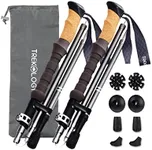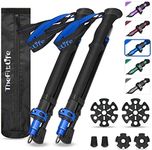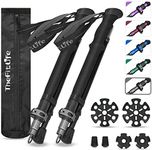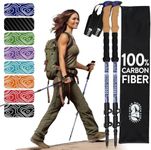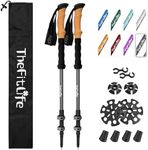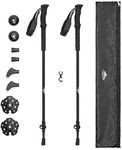Buying Guide for the Best Trekking Poles
Choosing the right trekking poles can make your hiking or trekking experience much more comfortable and enjoyable. Trekking poles help with balance, reduce strain on your joints, and provide extra support on uneven terrain. When picking trekking poles, it's important to consider your hiking style, the type of terrain you'll encounter, and your personal comfort. Understanding the key features will help you find a pair that matches your needs and enhances your outdoor adventures.MaterialThe material of trekking poles affects their weight, strength, and durability. Most poles are made from either aluminum or carbon fiber. Aluminum poles are generally more durable and can withstand rough handling, making them a good choice for rugged terrain or if you tend to be tough on your gear. Carbon fiber poles are lighter, which can reduce fatigue on long hikes, but they may be more prone to breaking under heavy stress. If you prioritize lightweight gear for long-distance hikes, carbon fiber might be best, but if you want something sturdy for rocky or challenging trails, aluminum is a solid option.
AdjustabilityAdjustable trekking poles allow you to change their length to suit different terrains or your height, while fixed-length poles are set at one size. Adjustable poles are versatile and can be shortened for uphill climbs or lengthened for descents, making them suitable for varied terrain. Fixed-length poles are lighter and simpler, which can be appealing for those who hike mostly on flat ground or want to save weight. If you hike in diverse environments or share your poles with others, adjustable poles are usually the better choice.
Grip MaterialThe grip is where your hand holds the pole, and it can be made from foam, cork, or rubber. Foam grips are soft and absorb sweat, making them comfortable for warm weather. Cork grips mold to your hand over time and handle moisture well, offering a natural feel and good comfort for long hikes. Rubber grips insulate against cold and are best for winter or wet conditions, but they can get slippery if your hands sweat. Choose the grip material based on the climate you'll be hiking in and your personal comfort preferences.
WeightThe weight of trekking poles can affect your energy levels, especially on long hikes. Lighter poles are easier to carry and swing with each step, reducing fatigue, but they may sacrifice some durability. Heavier poles are often sturdier and can handle more abuse, but they might feel cumbersome over time. If you plan on long-distance trekking or want to minimize effort, go for lighter poles. If you need something robust for tough trails, a bit of extra weight might be worth it.
Locking MechanismThe locking mechanism is what keeps adjustable poles at your chosen length. Common types include lever locks, twist locks, and push-button locks. Lever locks are easy to adjust and reliable, even with gloves on. Twist locks are more streamlined but can sometimes slip if not tightened properly. Push-button locks are simple and quick but may offer fewer length options. If you want quick and secure adjustments, lever locks are a popular choice, but consider what feels easiest for you to use.
Shock AbsorptionSome trekking poles have built-in shock absorbers, which are springs that cushion the impact on your wrists and arms, especially on downhill sections. This feature can be helpful if you have joint issues or plan to hike on hard surfaces. However, shock-absorbing poles can be slightly heavier and may feel less stable to some users. If you often experience joint pain or hike on rocky trails, shock absorption can be beneficial. If you prefer a more direct feel and lighter poles, you might skip this feature.
PackabilityPackability refers to how small the poles can be collapsed or folded for storage. Some poles fold down into three sections, making them very compact and easy to stow in a backpack, while others only collapse in length. If you travel often, need to pack your poles in luggage, or want to store them easily when not in use, look for highly packable designs. If you always carry your poles in hand, packability may be less important.

